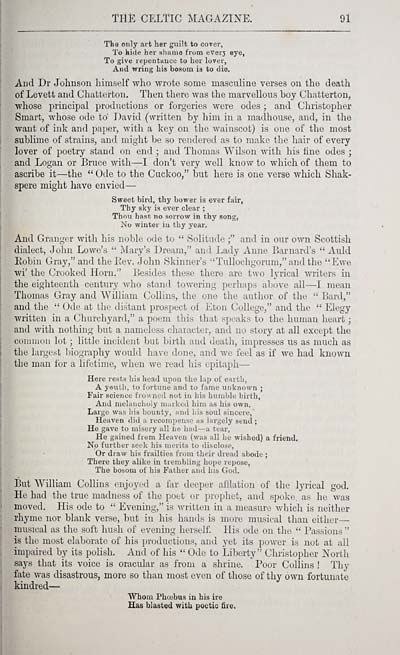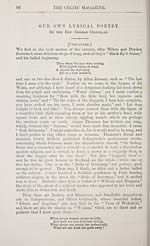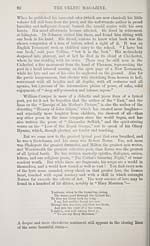Blair Collection > Celtic magazine > Volume 3
(101)
Download files
Complete book:
Individual page:
Thumbnail gallery: Grid view | List view

THE CELTIC MAGAZINE. 9l
The only art her guilt to cover,
To kide her shame from everj eye,
To give repentance to her lover.
And wring his bosom is to die.
And Dr Johnson himself who Avrote some masculine verses on the death
of Levett and Cluitterton. Then there was the marvellous boy Chatterton,
whose principal productions or forgeries were odes ; and Christopher
Smart, whose ode to' David (written by him in a madhouse, and, in the
want of ink and paper, with a key on the wainscot) is one of the most
sublime of strains, and might be so rendered as to make the hair of every
lover of poetry stand on end ; and Thomas Wilson with his fine odes ;
and Logan or Bruce with — I don't very well know to which of them to
ascribe it — the " Ode to the Cuckoo," but here is one verse which Shak-
spere might have envied —
Sweet bird, thy bower is ever fair,
Thy sky is ever clear ;
Thou hast no sorrow in thy song,
No winter in thy year.
And Granger with Ills noble ode to " Solitude ;" and in our own Scottish
dialect, John Lowe's " Mary's Dream," and Lady Anne Barnard's " Auld
Kobin Gray," and the Rev. John Skinner's "Tullochgorum," and the "Ewe
wi' the Crooked Horn." Besides these there are tAvo lyrical writers in
the eighteenth century who stand towering perhaps above all — I mean
Thomas Gray and William Collins, the one the author of the " Bard,"
and the " Ode at the distant prospect of Eton College," and the " Elegy
written in a Churchyard," a poem this that speaks to the human heart ;
and with nothing but a nameless character, and no story at all except the
comuiou lot ; little incident but birth and deatli, impresses us as much as
the largest Inogi'aphy would have done, and we feel as if we had known
the man for a lifetime, when we read his epitaph —
Here rests his head upon the lap of earth,
A youth, to fortune and to fame unknown ;
Fair science frowned not in his humble birth.
And melancholy marked him as his own.
Large was his bounty, and his soul sincere,"
Heaven did a recomisense as largely send ;
He gave to misery all he had — a tear.
He gained frem Heaven (was all he wished) a friend.
No further seek his merits to disclose.
Or draw his frailties from their dread abode ;
There they alike in trembling hope repose,
The bosom of his Father and his God.
But AVilliam Collins enjoyed a far deeper afflation of tlie lyi-ical god.
He had the true madness of the poet or prophet, and spoke, as he was
moved. His ode to " Evening," is written in a measure which is neither
rhyme nor blank verse, but in his hands is more musical than either —
musical as the soft hush of evening herself. His ode on the " Passions "
is the most elaborate of his productions, and yet its power is not at all
impaired by its polish. And of his " Ode to Liberty" Christopher North
says that its voice is oracular as from a shrine. Poor Collins ! Thy
fate was disastrous, more so than most even of those of thy own fortunate
kindred —
Whom Phoebus in his ire
Has blasted with poetic fire,
The only art her guilt to cover,
To kide her shame from everj eye,
To give repentance to her lover.
And wring his bosom is to die.
And Dr Johnson himself who Avrote some masculine verses on the death
of Levett and Cluitterton. Then there was the marvellous boy Chatterton,
whose principal productions or forgeries were odes ; and Christopher
Smart, whose ode to' David (written by him in a madhouse, and, in the
want of ink and paper, with a key on the wainscot) is one of the most
sublime of strains, and might be so rendered as to make the hair of every
lover of poetry stand on end ; and Thomas Wilson with his fine odes ;
and Logan or Bruce with — I don't very well know to which of them to
ascribe it — the " Ode to the Cuckoo," but here is one verse which Shak-
spere might have envied —
Sweet bird, thy bower is ever fair,
Thy sky is ever clear ;
Thou hast no sorrow in thy song,
No winter in thy year.
And Granger with Ills noble ode to " Solitude ;" and in our own Scottish
dialect, John Lowe's " Mary's Dream," and Lady Anne Barnard's " Auld
Kobin Gray," and the Rev. John Skinner's "Tullochgorum," and the "Ewe
wi' the Crooked Horn." Besides these there are tAvo lyrical writers in
the eighteenth century who stand towering perhaps above all — I mean
Thomas Gray and William Collins, the one the author of the " Bard,"
and the " Ode at the distant prospect of Eton College," and the " Elegy
written in a Churchyard," a poem this that speaks to the human heart ;
and with nothing but a nameless character, and no story at all except the
comuiou lot ; little incident but birth and deatli, impresses us as much as
the largest Inogi'aphy would have done, and we feel as if we had known
the man for a lifetime, when we read his epitaph —
Here rests his head upon the lap of earth,
A youth, to fortune and to fame unknown ;
Fair science frowned not in his humble birth.
And melancholy marked him as his own.
Large was his bounty, and his soul sincere,"
Heaven did a recomisense as largely send ;
He gave to misery all he had — a tear.
He gained frem Heaven (was all he wished) a friend.
No further seek his merits to disclose.
Or draw his frailties from their dread abode ;
There they alike in trembling hope repose,
The bosom of his Father and his God.
But AVilliam Collins enjoyed a far deeper afflation of tlie lyi-ical god.
He had the true madness of the poet or prophet, and spoke, as he was
moved. His ode to " Evening," is written in a measure which is neither
rhyme nor blank verse, but in his hands is more musical than either —
musical as the soft hush of evening herself. His ode on the " Passions "
is the most elaborate of his productions, and yet its power is not at all
impaired by its polish. And of his " Ode to Liberty" Christopher North
says that its voice is oracular as from a shrine. Poor Collins ! Thy
fate was disastrous, more so than most even of those of thy own fortunate
kindred —
Whom Phoebus in his ire
Has blasted with poetic fire,
Set display mode to: Large image | Transcription
Images and transcriptions on this page, including medium image downloads, may be used under the Creative Commons Attribution 4.0 International Licence unless otherwise stated. ![]()
| Early Gaelic Book Collections > Blair Collection > Celtic magazine > Volume 3 > (101) |
|---|
| Permanent URL | https://digital.nls.uk/76444702 |
|---|
| Description | Volume III, 1878. |
|---|---|
| Shelfmark | Blair.4 |
| Attribution and copyright: |
|
| Description | A selection of books from a collection of more than 500 titles, mostly on religious and literary topics. Also includes some material dealing with other Celtic languages and societies. Collection created towards the end of the 19th century by Lady Evelyn Stewart Murray. |
|---|
| Description | Selected items from five 'Special and Named Printed Collections'. Includes books in Gaelic and other Celtic languages, works about the Gaels, their languages, literature, culture and history. |
|---|

